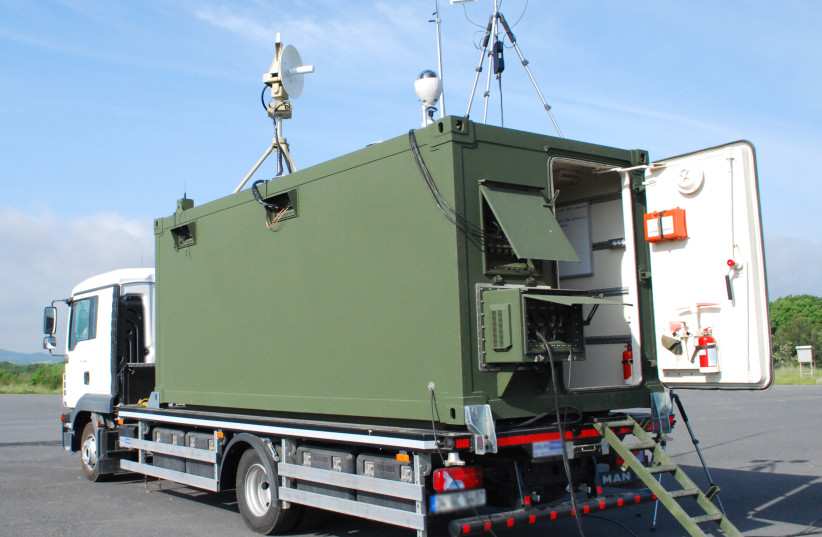Turkey’s defense industry is set to boom after Ukraine’s use of its drones to combat Russia’s invasion has attracted international attention, analysts tell The Media Line.
The Baykar Bayraktar TB2, an unmanned military combat drone manufactured by Turkish company Baykar Defense, has been lauded by Kyiv for its use in successful attacks against the Russian forces.
On Thursday, Baykar CEO Haluk Bayraktar posted a photo of him meeting with Ukrainian President Volodymyr Zelensky and wishing him victory over the invaders.
On Sunday, Ukraine’s embassy in Ankara posted a video showing what looked like a Turkish drone hitting a Russian military column.
The drones have grabbed headlines are the world, with media outlets stating, “Ukraine’s Secret Weapon Against Russia: Turkish Drones” and “Ukraine Leans on Armed Turkish Drones, Western Missiles to Thwart Russian Invasion.”

Arda Mevlütoğlu, an Ankara-based defense analyst, told The Media Line that Turkey tried to buy drones decades ago from the US but it seemed reluctant to sell them.
Ankara has used drones in its four-decade fight against an insurgency by the Kurdistan Workers’ Party (PKK).
On Thursday, Deputy Foreign Minister Yavuz Selim Kıran told the pro-government Sabah media outlet that Kyiv’s purchase of the drones was directly from the private Baykar firm and not a deal with Turkey.
“Private defense industry companies can make such agreements with countries. … We will not lose our position negotiating with both sides,” Kıran said.
Mevlütoğlu said that while Baykar is a private company, defense exports are heavily monitored by the government.
“It’s not just a consumer product or civilian technology … that these companies are selling. So, if somehow these companies are delivering these systems, it’s under direct control and monitoring [by] both parties, both governments,” he said.
Berk Esen, a professor of political science at Istanbul’s Sabanci University, told The Media Line the Turkish government does not want to be vocal about the drone’s success because it is afraid of Russia’s reaction.
“The ruling circles are quite worried about this drone issue getting out of hand.”
However, the drone’s successful deployment would strongly promote the country’s defense industry, he said.
“It shows that investing in the drones was a good strategy on the part of Ukraine. That’s why the Ukrainian government … has really promoted this issue.”
Esen added that Ukraine promoting the success of the drones could be an attempt to drive a wedge between Turkey and Russia.
Mevlütoğlu expects demand for Turkish drones to increase significantly and that the defense industry will create new models.
He estimated that more than 300 drones have been manufactured so far.
Mevlütoğlu said the Turkish drones’ appeal to foreign buyers came from a balance of performance, cost, and ease of operation.
“They are sophisticated, they have advanced technology but not so advanced … to maintain, and they are sophisticated but not so expensive,” he said. “I think that makes them a very effective weapon platform and surveillance platform.”
However, he stressed that there is no evidence that Turkey has exported the drones since Russia’s attack started.
“[That] would put Turkey in a very difficult position diplomatically and militarily because it would make Turkey a direct party in the conflict,” he said. “It would make the situation with Russia a lot more complicated.”
Ankara has strained to balance its ties with Kyiv and Moscow.
Russia is a major source of energy, trade, and tourism, crucial sectors for Turkey.
President Recep Tayyip Erdoğan has for several years tried to improve relations with Russian President Vladimir Putin.
This effort notably included been the purchase of a Russian anti-missile air defense system, the S-400s, which led to Washington kicking its NATO ally out of the F-35 Joint Strike Fighter program.
Russia and its historical rival Turkey support opposing sides in Syria.
Erdoğan has tried to mediate between Ukraine and Russia, proposing to host peace talks.
While Zelensky was open to the possibility, Putin has not accepted the offer.
